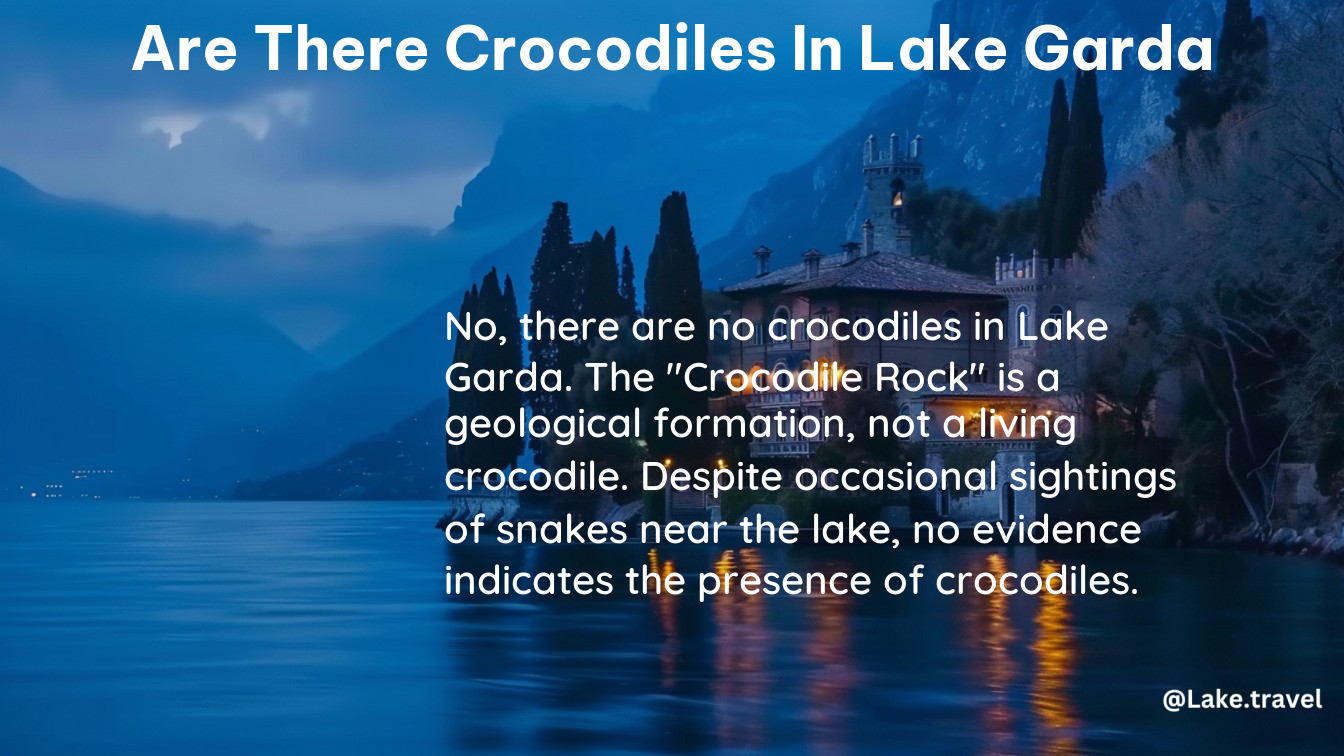Are there crocodiles in Lake Garda? The short answer is no, there are no crocodiles in Lake Garda. Despite the lake’s unique geological feature known as the “Crocodile Rock,” which resembles a crocodile when viewed from a certain angle, there is no evidence of actual crocodiles residing in the lake.
The Crocodile Rock: A Geological Curiosity
Lake Garda, located in northern Italy, is known for its stunning natural beauty, with towering mountains, crystal-clear waters, and picturesque towns dotting its shores. One of the lake’s most intriguing features is the “Crocodile Rock,” a natural formation that appears to resemble a crocodile when viewed from a specific angle.
The Crocodile Rock is a geological curiosity that has captured the imagination of visitors to Lake Garda for centuries. This unique rock formation is located near the town of Malcesine, on the eastern shore of the lake. The rock’s distinctive shape, with its elongated body and protruding “head,” has led many to believe that it is the remnant of an ancient crocodile or other prehistoric creature.
However, despite the rock’s striking resemblance to a crocodile, there is no evidence that any such creatures ever inhabited the waters of Lake Garda. The Crocodile Rock is simply a natural geological formation, created over time by the erosive forces of wind and water.
The Ecology of Lake Garda

Lake Garda is home to a diverse array of plant and animal life, but crocodiles are not among them. The lake’s ecosystem is dominated by a variety of fish species, including trout, perch, and carp, as well as a range of aquatic plants and invertebrates.
The lake’s climate and geography are not suitable for the survival of crocodiles, which are typically found in tropical or subtropical regions. Lake Garda’s temperate climate, with its cool winters and mild summers, is simply not warm enough to support a population of crocodiles.
Moreover, the lake’s depth and water chemistry are not conducive to the needs of crocodiles. Crocodiles require warm, shallow waters with a high concentration of dissolved minerals, which are not found in the deep, clear waters of Lake Garda.
Debunking the Crocodile Myth
Despite the persistent myth of crocodiles in Lake Garda, there is no credible evidence to support this claim. No sightings of crocodiles in the lake have been reported, and no remains or fossils of these animals have ever been discovered in the surrounding area.
The Crocodile Rock, while a fascinating geological feature, is simply a natural formation that has been shaped by the forces of nature over time. It does not indicate the presence of any actual crocodiles in the lake.
Exploring the Beauty of Lake Garda
While there may be no crocodiles in Lake Garda, the lake offers a wealth of other natural wonders and attractions for visitors to explore. From the picturesque towns and villages that dot its shores to the stunning mountain landscapes that surround it, Lake Garda is a true gem of northern Italy.
Visitors to the lake can enjoy a wide range of activities, from hiking and cycling to water sports and sightseeing. The region is also renowned for its delicious local cuisine, including the famous Garda olive oil and the region’s renowned wines.
Conclusion
In conclusion, there are no crocodiles in Lake Garda. The Crocodile Rock is a unique geological formation that merely resembles a crocodile, but it does not indicate the presence of any actual crocodiles in the lake. Lake Garda is a beautiful and diverse ecosystem, home to a wide range of plant and animal life, but crocodiles are not among them.
Whether you’re a nature enthusiast, a water sports enthusiast, or simply someone who appreciates the beauty of the great outdoors, Lake Garda is a destination that is sure to captivate and delight. So why not plan a visit and discover the wonders of this stunning Italian lake for yourself?
